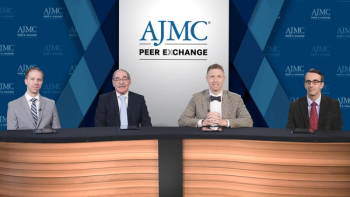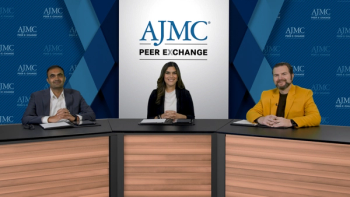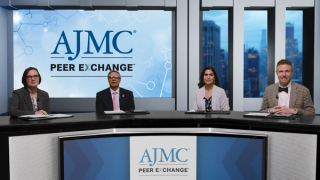
Clinical
Latest News
Latest Videos

CME Content
More News

Patients with advanced epithelial ovarian cancer who were non-Hispanic Black, older, had lower household income, resided in nonmetropolitan areas, and were unmarried had higher odds of refusing cytoreductive surgery.

Experts agree that the expansion of telehealth was one of the most significant positive outcomes of the COVID-19 pandemic.

Lipoprotein a (Lp[a]) is a valuable tool for assessing a patient's risk of cardiovascular disease, which can facilitate earlier intervention efforts and reduce health care costs, argued Jeremy Wigginton, MD.

The analysis supports the integration of sodium-glucose cotransporter 2 (SGLT2) inhibitors into treatment paradigms for patients with chronic kidney disease (CKD) not only for their established benefits but also for addressing anemia.

The findings from this single-center retrospective study compare outcomes between 2 groups of patients living with connective tissue disease–associated pulmonary arterial hypertension (CTD-PAH) stratified by their Heart Failure Association–preserved ejection fraction (HFA-PEFF) algorithm score.

Long-term extension analysis of the phase 3b APEX study (NCT04882098) through 3 years of treatment will further assess the sustained efficacy of guselkumab (Tremfya; Johnson & Johnson) in limiting structural damage in patients with active psoriatic arthritis (PsA).

World Health Day 2025 highlights the importance of improving maternal and newborn health, emphasizing the need for quality care and investment in regions facing high mortality rates.

In 2021, UnitedHealth Group received 42% of the $33 billion in additional Medicare Advantage payments from differential coding.

This article reviews underlying barriers to health care access and discusses how a value-based diabetes care model could improve patient outcomes and reduce long-term costs.

Clinical approaches to non-Hodgkin lymphoma in younger and older patient groups generally do not differ, according to Andrew Evens, DO, but he emphasized the need for deeper clinical insights into potential biologic differences in younger oncology patients.

The experts emphasized that these shortcomings must be addressed to be better prepared for future public health crises.

This study validates criteria to identify patients with inflammatory bowel disease (IBD) at risk of worsening disease who may benefit from early treatment with advanced therapies.

Panelists discuss how immunoglobulin A (IgA) nephropathy diagnosis requires kidney biopsy with immunofluorescence showing dominant or codominant IgA deposits in the mesangium, often accompanied by C3 and sometimes IgG or IgM.

A panelist discusses how real-world evidence from a large cohort study (n = 31521) presented at AAD 2025 reveals notable differences in treatment patterns, discontinuation rates, persistence, and adherence among psoriasis patients treated with different biologics including tildrakizumab, risankizumab, guselkumab, and ustekinumab, with implications for clinical decision-making based on early versus late disease onset and prior biologic exposure.

Panelists discuss how immunoglobulin A (IgA) nephropathy develops through a complex 4-hit cascade involving aberrant IgA1 glycosylation, anti-glycan antibody formation, immune complex deposition, and inflammatory kidney damage.

Experts agree that telemedicine continues to majorly impact health care post pandemic.

Experts discuss innovations and advancements in bispecific antibodies that could transform their use in the next 5 years.

Experts discuss how bispecifics might be incorporated earlier in the lines of treatment for certain cancers, the steps that can be taken to improve access to bispecific therapies in underserved or rural community settings, and how partnerships among academic centers, manufacturers, and community practices can help accelerate the adoption of bispecific antibodies.

Experts discuss the most promising applications of bispecifics in solid tumors and other emerging therapeutic areas.

Experts discuss how payer and reimbursement considerations affect access to bispecific therapies in different practice settings.

Experts discuss how institutions can address the resource and bandwidth challenges that come with administering complex therapies like bispecifics.

Panelists discuss how standard-of-care antibiotics for uncomplicated urinary tract infections (UTIs) show varying efficacy, with nitrofurantoin and fosfomycin demonstrating superior response rates (85%-95%) compared with trimethoprim/sulfamethoxazole (70%-80% due to increasing resistance) and first-generation cephalosporins (80%-90%), and how cost-effectiveness depends on local resistance patterns, patient adherence to dosing schedules, medication costs and insurance coverage, treatment duration, recurrence rates, comorbidities, and potential adverse effects requiring additional interventions.

Panelists discuss how clinicians should interpret Clinical Dementia Rating-Sum of Boxes (CDR-SB) score changes by correlating numerical shifts with meaningful real-world outcomes, considering both the statistical significance and clinical meaningfulness of changes, recognizing that even modest improvements may represent significant functional preservation for patients, and contextualizing these changes within individual patient circumstances, disease trajectory, and impact on quality of life.

Experts discuss the role of technology, such as electronic health record (EHR) integration, in improving the operationalization of bispecific antibodies.

Panelists discuss how amyloid-targeting therapies for Alzheimer disease represent a breakthrough drug class that works by binding to and removing beta-amyloid plaques through various mechanisms, demonstrating modest cognitive decline reduction in clinical trials while presenting safety considerations including amyloid-related imaging abnormalities (ARIA), infusion reactions, and the need for careful patient selection and monitoring protocols.















